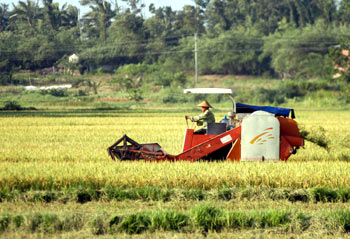
Rice harvesting, Hainan Province
CHINA became the world’s third-largest food aid donor last year, the same year it stopped receiving assistance from the World Food Program, while the United States and the European Union remained the top two contributors, the UN agency said today.
Donations from China almost tripled to 577,000 metric tons (636,000 tons) and accounted for more than half of the rise in overall food aid donations last year, the World Food Program said in its annual report.
It’s always a bit of a surprise when incremental changes result in a qualitative change. The Chinese government admits that bringing farmers into the 21st Century is one of their toughest tasks. Eliminating farm taxes, this year, was part of what they’re trying.
Wheat and wheat flour were the main commodities donated [by all countries], followed by coarse grains like maize and maize meal, and rice.
“Donations of food made the difference between life and death after the tsunami, the Pakistan earthquake and in Sudan, so we are extraordinarily grateful to all who gave last year,” James T. Morris, the WFP’s executive director, said in a statement.
As I recall, China’s longterm goals include modernizing food production enough to allow for about half of today’s rural population to continue to move to something more like the urban proportion of Western industrial societies.















Dealing with Zaibatsu and Japan with a 2600 year history was difficult enough…when I was young and adventuresome. Dealing with China on something broader than short-term/long-term economics requires an understanding that rolls back 4600 years — with all the increased complexity you’d expect.
When these dudes talk about “tradition” — they’re offering up more of a juggernaut than most students of history care to confront. I wonder if we invite people with that capacity into the Departments of State or Commerce, anymore?
I doubt it.
“Eliminating farm taxes…” What? You mean cutting taxes was a good thing? Now if only we can get 1/2 of the people in the US to realize that.
You idiot.
They eliminated taxes on the poorest of the poor, because they could barely afford to subsistence farm.
Amazing how not charging the poor helps the economy.
Notice how the article says nothing about any other taxes.
Thanks for the personal assault. You’re mastery of the English language (press 1) is overwhelming.
With that said, I just re-read the article. No where in the article does it mention taxes nor the relief that it’s for the “poorest of the poor.” I was commenting on John’s editorial.
Whose editorial?
There ain’t much reading more boring than tax legislation; but, what little I recall of recent stuff out of China is (1) they did eliminate taxes on farmers — who are the poorest people in the nation; (2) they’ve just begun a progressive taxation system that was first utilized for film and music stars — being some of the wealthiest — and who participated in the legislation.
My best guess is that within the next five years they’ll have a full-blown progressive taxation schedule in place.
But, then, Eideard’s post is about food production and distribution — and getting to enough of a surplus to begin to help out “neighbors” is a positive node in Asian history. As it was when Japan reached the same economic level — though still a major food importer. And as it was — as described in the article, this past year — when China’s effort surpassed Japan. Japan didn’t stop because someone else offered more help.
Notice the photo is of a powered combine, not a water buffalo. I point that out because the modernization is consuming a lot of oil, and the rate is rapidly increasing. This is the real reason for the average price of sweet crude, not the occasional tensions in the Middle East. The next battlefield over oil may be within Asia. This is all the more reason to ween the US off the petrol teat. Remember the agrochemical industry takes a lot of petroleum also. In the coming years a conflict between Russian and China over oil is possible, especially given their historically cool relationship. I personally wouldn’t like having a dog in that fight.
Great, another country to dump their excess, subsidized food stuffs into third world markets at zero cost; destroying any local farming industry.
Pretty good, ES. You must have read that one at a liberal PC site — instead of the usual neo-con PC site.
Part of the process described has been China’s transition from a 3rd World economy. Most of it. But, then, you left out the part where you tell housewives they really don’t need washing machines — be happy with rocks at the side of a river. Or, maybe, join RT up above in his plan to encourage American farmers to go back to iron plows and 2 mules — to save on oil.